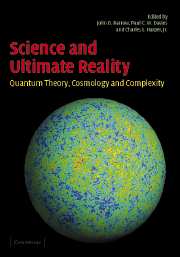Book contents
- Frontmatter
- Contents
- List of contributors
- Foreword
- Editors' preface
- Preface
- Acknowledgments
- Part I An overview of the contributions of John Archibald Wheeler
- Part II An historian's tribute to John Archibald Wheeler and scientific speculation through the ages
- Part III Quantum reality: theory
- Part IV Quantum reality: experiment
- Part V Big questions in cosmology
- Part VI Emergence, life, and related topics
- 26 Emergence: us from it
- 27 True complexity and its associated ontology
- 28 The three origins: cosmos, life, and mind
- 29 Autonomous agents
- 30 To see a world in a grain of sand
- Appendix A Science and Ultimate Reality Program Committees
- Appendix B Young Researchers Competition in honor of John Archibald Wheeler for physics graduate students, postdoctoral fellows, and young faculty
- Index
26 - Emergence: us from it
from Part VI - Emergence, life, and related topics
Published online by Cambridge University Press: 29 March 2011
- Frontmatter
- Contents
- List of contributors
- Foreword
- Editors' preface
- Preface
- Acknowledgments
- Part I An overview of the contributions of John Archibald Wheeler
- Part II An historian's tribute to John Archibald Wheeler and scientific speculation through the ages
- Part III Quantum reality: theory
- Part IV Quantum reality: experiment
- Part V Big questions in cosmology
- Part VI Emergence, life, and related topics
- 26 Emergence: us from it
- 27 True complexity and its associated ontology
- 28 The three origins: cosmos, life, and mind
- 29 Autonomous agents
- 30 To see a world in a grain of sand
- Appendix A Science and Ultimate Reality Program Committees
- Appendix B Young Researchers Competition in honor of John Archibald Wheeler for physics graduate students, postdoctoral fellows, and young faculty
- Index
Summary
Emergence, some say, is merely a philosophical concept, unfit for scientific consumption. Or, others predict, when subjected to empirical testing it will turn out to be nothing more than shorthand for a whole batch of discrete phenomena involving novelty, which is, if you will, nothing novel. Perhaps science can study emergences, the critics continue, but not emergence as such.
It's too soon to tell. But certainly there is a place for those, such as the scientist to whom this volume is dedicated, who attempt to look ahead, trying to gauge what are Nature's broadest patterns and hence where present scientific resources can best be invested. John Archibald Wheeler formulated an important motif of emergence in 1989:
Directly opposite to the concept of universe as machine built on law is the vision of a world self-synthesized. On this view, the notes struck out on a piano by the observer–participants of all places and all times, bits though they are, in and by themselves constitute the great wide world of space and time and things.
(Wheeler 1999: 314.)Wheeler summarized his idea – the observer–participant who is both the result of an evolutionary process and, in some sense, the cause of his own emergence – in two ways: in the famous sketch given in Fig. 26.1 and in the maxim “It from bit.” In the attempt to summarize this chapter's thesis with an equal economy of words I offer the corresponding maxim, “Us from it.”
- Type
- Chapter
- Information
- Science and Ultimate RealityQuantum Theory, Cosmology, and Complexity, pp. 577 - 606Publisher: Cambridge University PressPrint publication year: 2004
- 8
- Cited by



